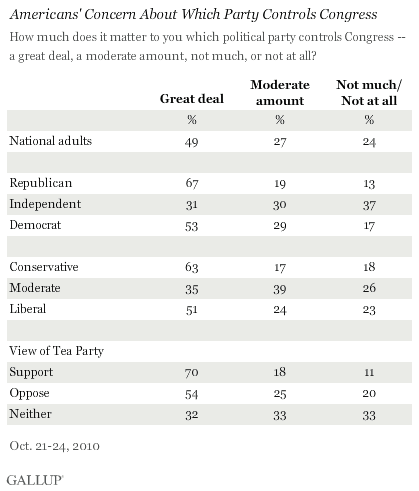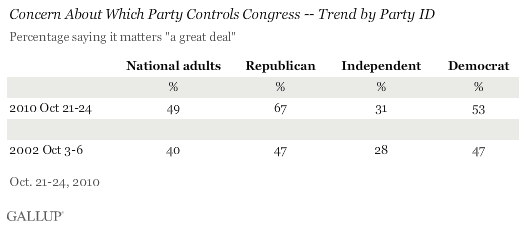PRINCETON, NJ -- In Gallup polling conducted barely a week before the midterm elections, 49% of Americans say the issue of which party controls Congress matters a great deal to them, a sentiment that rises to 70% among Tea Party supporters, 67% among Republicans, and 63% among conservatives. Just over half of Tea Party opponents, as well as liberals and Democrats, say the political leadership of Congress matters greatly to them.

Among registered voters who attach a great deal of importance to the political balance in Congress, 55% say they intend to vote for the Republican candidate in their own district, while 43% would vote for the Democrat. Among those who think the party in the majority is less important, the plurality (48%) intend to vote Democratic.
Majority Power Relevance Is Up From '02
More Americans care a great deal about the political balance in Congress than did so eight years ago: the current 49% is up from 40% in 2002. The increase is mainly the result of a 20-point surge in concern among Republicans, as the proportions of independents and Democrats saying party control matters a great deal to them have changed little.

As a result of these differential party trends, Republicans are now more likely than Democrats to rate control of Congress as highly important, whereas in 2002 the two parties had the same views on the measure.
Bottom Line
Republicans are more engaged in the 2010 midterms than Democrats, a finding evident in Gallup's enthusiasm measure all year and, more recently, in voter turnout measures. Precisely why that is so is another question, perhaps answered in part by the finding that Republicans are more likely to believe the outcome of the elections is highly relevant. In other words, Republicans perceive that more is at stake. If that motivation indeed translates into higher turnout, Republicans will likely get what they want on Tuesday in the form of a strong Republican majority in the House.
Explore more Gallup data relating to the upcoming congressional midterm elections, including Gallup's complete generic ballot trend since 1950, in our Election 2010 Key Indicators interactive.
Learn more about Gallup's likely voter models for the 2010 midterm congressional elections.
Results for this Gallup poll are based on telephone interviews conducted Oct. 21-24, 2010, with a random sample of 1,021 adults, aged 18 and older, living in the continental U.S., selected using random-digit-dial sampling.
For results based on the total sample of national adults, one can say with 95% confidence that the maximum margin of sampling error is ±4 percentage points.
Interviews are conducted with respondents on landline telephones (for respondents with a landline telephone) and cellular phones (for respondents who are cell phone-only). Each sample includes a minimum quota of 150 cell phone-only respondents and 850 landline respondents, with additional minimum quotas among landline respondents for gender within region. Landline respondents are chosen at random within each household on the basis of which member had the most recent birthday.
Samples are weighted by gender, age, race, education, region, and phone lines. Demographic weighting targets are based on the March 2009 Current Population Survey figures for the aged 18 and older non-institutionalized population living in continental U.S. telephone households. All reported margins of sampling error include the computed design effects for weighting and sample design.
In addition to sampling error, question wording and practical difficulties in conducting surveys can introduce error or bias into the findings of public opinion polls.
View methodology, full question results, and trend data.
For more details on Gallup's polling methodology, visit www.gallup.com.
